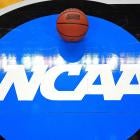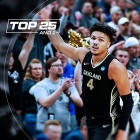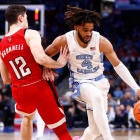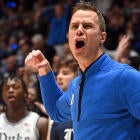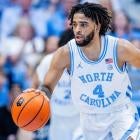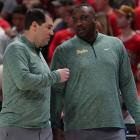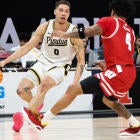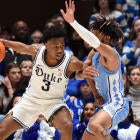College athletics -- specifically college basketball -- is getting a significant rulebook makeover.
And the FBI's investigation into the sport's crooked recruiting practices is primarily why.
The NCAA announced on Wednesday widespread, sweeping changes to college basketball's bylaws, its recruiting calendar and, in an evolutionary step forward, new legislation that gives more entitlements to student-athletes.
The biggest changes are these:
- All players who get invited to the NBA Combine but go undrafted will have the option to return to their former school.
- Elite prospects will now be allowed to have official relationships with agents. This applies to high schoolers and college athletes alike. USA Basketball, in conjunction with the NCAA, will be tasked with identifying which prospects in a given class are "elite." In regard to high school athletes, however, the rules will not go into effect until the NBA changes its current age-limit rule.
- The NCAA is requiring all school presidents, chancellors and athletics staff members to contractually comply with any and all future investigations. This is the NCAA's way of trying to institute a de facto version of subpoena power, which it lacked previously.
- School presidents and chancellors will now personally be held accountable by the NCAA for their athletic departments abiding by the rules.
- The FBI's case into college basketball brought about mounds of documents of information. Previously, the NCAA did not allow for information and findings from outside investigations at established agencies to be used in its infractions process. Effective immediately, the NCAA and its Committee on Infractions can use information obtained in other probes as a means to an end for its own investigations. This will be implemented immediately by the NCAA with the schools currently caught up in the Department of Justice's case regarding multiple schools -- and alleged violations of multiple federal laws.
- The recruiting calendar, as detailed here, is getting a major overhaul. In a first, college coaches will be allowed to attend the NBA Players Association Top 100 camp each June. Also, the first live period of July will be attendable for non-scholastic events.
Other changes include harsher punishments, such as postseason bans on programs that can last up to five years; potential lifetime show-causes for Level 1 violations from coaches; and suspensions for head coaches that can last more than a year.
The alterations to the NCAA rulebook come at a time when the very nature of college athletics, and what should constitute the ideas of amateur athletes, are continually being challenged. In the past decade there has been growing sentiment that college athletes should be able to benefit financially off their image and likeness. But Wednesday's set of reforms did not address that issue.
The new bylaws mark the first official changes to the NCAA rulebook in men's Division I basketball since last year's FBI bombshell rocked the sport. When that happened, NCAA president Mark Emmert vowed there would be swift and significant change. Wednesday's news marks the start of that change.
Many of the changes unveiled Wednesday were previously detailed by CBS Sports. Most of these amendments to the rulebook are in coordination with recommendations that were made in April by the Commission on College Basketball, which was chaired by Condoleezza Rice.
The changes come with a lot of anticipation and skepticism amongst the coaching community. Nevertheless, because of the bad publicity to college basketball, an overhaul of the recruiting model was inevitable.
"This week, we delivered on a promise made just months ago to make profound and meaningful changes to college basketball," the NCAA said on behalf of its "joint leaders" in a statement. "Ultimately, these decisions will support the success of student-athletes both on and off the court."
A lot of the changes detailed on Wednesday relate to recruiting, as that is the origin of much of the sport's bad publicity since last September. College basketball will be recruited on a different timetable, and in a significantly different way, going forward. One change that didn't happen? Coaches were hoping that the NCAA would allow for low-level staff members (like operations directors and video coordinators) to be able to do on-court skill instruction.
Instead, nothing.
"It's incomprehensible," one prominent college coach told CBS Sports.
Dozens of coaches contacted by CBS Sports expressed cynicism as to whether new legislation could realistically affect how much cheating happens in the sport.
Multiple sources told CBS Sports that the NABC and the Rice Commission were prepared for blowback on some of its recommendations, but those parties had planned to push forward regardless of inevitable backlash from the college coaching fraternity at large. Nevertheless, when news leaked in July about a potential set of rule changes on the docket with the recruiting calendar, the NCAA and its working group representatives listened to some criticism and made alterations.
That is why the July period still has a non-scholastic window.
All the rule changes put forth on Wednesday go into effect retroactively, as of Aug. 1, or will be implemented beginning in 2019 as the calendar dictates.












